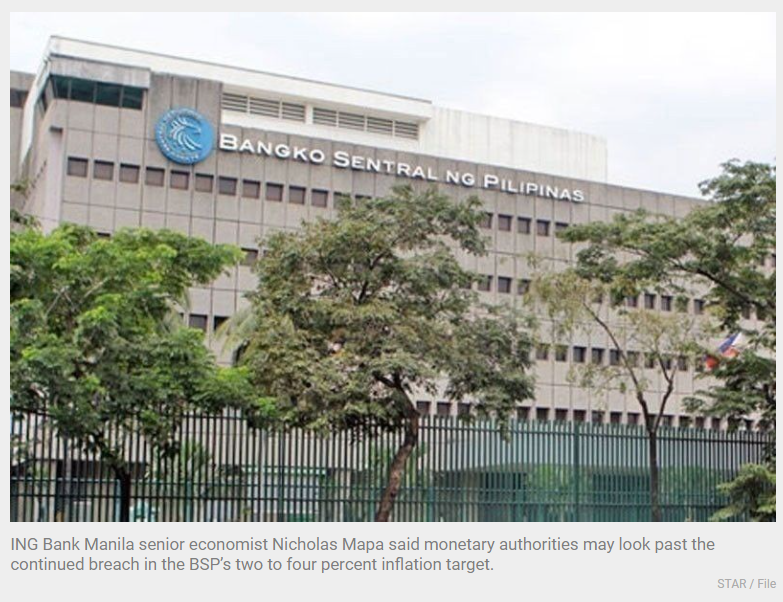Philippines: Economists see BSP maintaining policy rates
MANILA, Philippines — Economists expect the Bangko Sentral ng Pilipinas (BSP) to keep the benchmark interest rate steady at an all-time low of two percent despite the upward pressure on commodity prices.
ING Bank Manila senior economist Nicholas Mapa said monetary authorities may look past the continued breach in the BSP’s two to four percent inflation target.
“Despite the spike in price pressures, we fully expect the central bank to look past this renewed surge given the supply side nature of the breach. We believe the BSP will hold rates unchanged until palpable signs of recovery manifest, which could be a couple more months away,” Mapa said.
Inflation averaged 4.4 percent in the first eight months after it accelerated to 4.9 percent in August from four percent in July due to the recent increase in food prices brought about by inclement weather.
The Dutch financial giant sees inflation averaging 4.2 percent this year, slightly above the BSP’s two to four percent target. It expects inflation to ease starting November this year.
As part of its COVID response measures, the BSP slashed interest rates by 200 basis points and lowered the reserve requirement ratio last year. Other measures that helped unleash P2.3 trillion into the financial system include the P540 billion provisional advances to the national government, the purchase of government securities in the secondary market, among others.
Mapa said BSP Governor Benjamin Diokno has repeatedly reiterated his stance to keep policy settings accommodative given the ongoing economic recession.
“Any calls for a preemptive tightening at this stage will largely be discounted by the BSP given the likely detrimental impact rate hikes would have on recovery efforts. Furthermore, the BSP is fully aware that rate increases remain largely ineffective against addressing cost-push inflation,” Mapa said.
According to Mapa, previous experiences such as in 2018 prove that rate hikes would do little to cure the peso depreciation and oftentimes fuel additional pressure for the currency to weaken.
Likewise, Security Bank chief economist Robert Dan Roces said the BSP is expected to hold and look past the inflation spikes with a cautious eye as it moves to support growth in the quarters ahead.
“Inflation forecasts may likely be adjusted slightly upward with oil, food, and a global port congestion providing risks,” Roces said.
UnionBank chief economist Ruben Carlo Asuncion raised the bank’s consumer price index (CPI) projection to 4.4 percent from the original target of 4.1 percent for this year.
Michael Ricafort, chief economist at Rizal Commercial Banking Corp., also expects the central bank to keep interest rates steady, but the inflation forecasts for 2021 and 2022 could be revised upward.
“Thus, more accommodative monetary policy would still continue in terms of keeping the key local policy rate unchanged at the record low of two percent as long as necessary, especially if risks of lockdowns remain, as well as possible cut in large bank’s RRR, especially if inflation stabilizes in the coming months,” Ricafort said.
Although the BSP is seen keep interest rates at bay on Thursday despite recent trends showing inflationary expectation are no longer well anchored, Bank of the Philippine Islands lead economist Jun Neri believes maintaining negative interest rates could lead to a loss of confidence in the central bank.
“With the pace of vaccinations improving exponentially since July, and economic reopening looking more viable, keeping real interest rates in deep negative territory no longer looks necessary and may in fact lead to a loss of confidence on the independence of the monetary authorities,” Neri said.
Even in the face of the Delta variant’s disruptive effect on their recovery, Neri said central banks from Brazil, Turkey, South Korea, Russia Chile and Peru have begun unwinding their negative real interest rates to assure the public that they stand firm on their goals of price and financial stability.
Source: https://www.philstar.com/business/2021/09/20/2128252/economists-see-bsp-maintaining-policy-rates


 English
English




